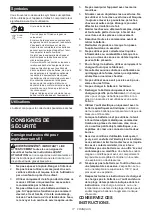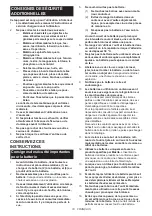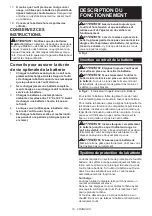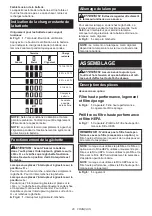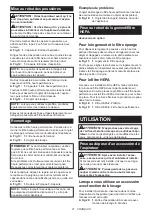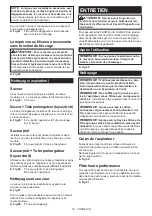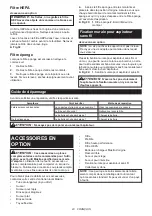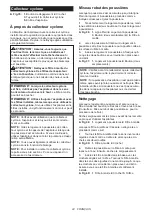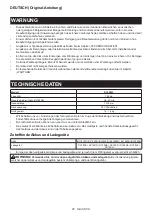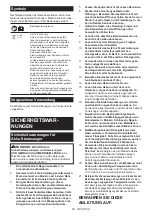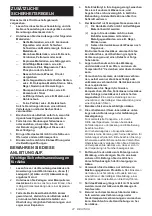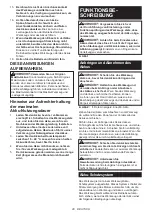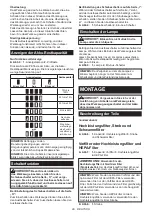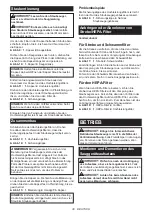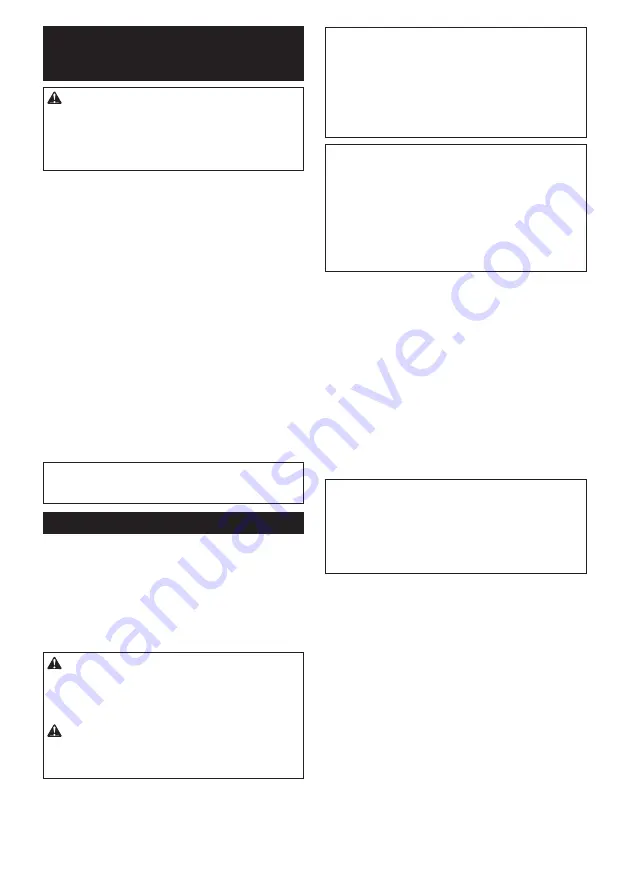
15
ENGLISH
OPTIONAL
ACCESSORIES
CAUTION:
These accessories or attachments
are recommended for use with your Makita tool
specified in this manual.
The use of any other
accessories or attachments might present a risk of
injury to persons. Only use accessory or attachment
for its stated purpose.
If you need any assistance for more details regard-
ing these accessories, ask your local Makita Service
Center.
•
Extension wand (Straight pipe)
• Nozzle
•
Nozzle for carpet
•
Shelf brush
•
Corner nozzle
•
Round brush
•
Flexible hose
• Filter
•
Prefilter
•
High performance filter
•
HEPA filter
•
Makita genuine battery and charger
•
Free nozzle
•
Seat nozzle
•
Crevice nozzle
•
Wall mount for cordless cleaner
•
Cyclone attachment
NOTE:
Some items in the list may be included in the
tool package as standard accessories. They may
differ from country to country.
Cyclone attachment
►
Fig.35:
1.
Release button
2.
Hook
3.
Straight pipe
4.
Cyclone attachment
5.
Suction inlet
About the cyclone attachment
Using the cleaner with the cyclone attachment installed
reduces the amount of dust that enters the capsule,
which helps to prevent the suction force from weaken-
ing. In addition, cleaning after use is also simple.
CAUTION:
Always be sure that the tool is
switched off and the battery cartridge is removed
before carrying out any work on the tool.
If the
battery cartridge is left inserted, the cleaner may start
unexpectedly and result in injury.
CAUTION:
Clean the mesh filter of the
cyclone attachment and the filters of the cleaner
unit when they become clogged.
Continued use in
the clogged condition may result in heating or smoke.
NOTICE:
When the cyclone attachment is
attached, do not use the cleaner in the horizontal
or upward facing condition.
Doing so may cause
the mesh filter to become clogged.
NOTICE:
Always use the cleaner with the filters
installed, even when using the cyclone attach-
ment.
Using the cleaner without the filters installed
may result in a motor malfunction.
NOTE:
Check that the cyclone attachment, cleaner,
and straight pipe are locked properly before use.
NOTE:
Empty the dust case of the cyclone attachment
and the capsule of the cleaner when dust has accumu-
lated. Continued use will result in weakened suction force.
NOTE:
You can also use the cyclone attachment with-
out lock function.
NOTE:
To install or remove the cyclone attachment, refer to
the section "Installing or removing the cleaner attachment".
Disposing of dust
When dust has accumulated up to the full line of the dust
case, follow the procedure below and dispose of the dust.
1.
Hold the dust case firmly, press and hold the two
buttons, and remove the dust case.
►
Fig.36:
1.
Full line
2.
Dust case
3.
Button (two
locations)
4.
Mesh filter
2.
Dispose of the dust inside the dust case and
remove any dust and powder adhered to the surface of
the mesh filter.
3.
Insert the dust case all the way until the two but-
tons lock with a click.
►
Fig.37:
1.
Dust case
2.
Button (two locations)
NOTE:
Check that the cyclone attachment, cleaner,
and straight pipe are locked properly before restarting
operation.
NOTE:
If the suction force does not recover even
after disposing of the dust and cleaning the mesh
filter, check whether dust has accumulated in the
capsule of the cleaner or clogging has occurred.
Cleaning
When the dust case becomes dirty or the mesh filter is
clogged, remove and wash them with water. (Refer to
“Disposing of dust” for the removal procedure.)
Dry the parts thoroughly before reinstallation and use.
►
Fig.38:
1.
Dust case
2.
Mesh filter
When the mesh filter gets dirty badly, clean it in the
following procedures.
1.
Turn the mesh filter counterclockwise and remove
it while the hooks are unlocked.
►
Fig.39:
1.
Mesh filter
2.
Hook
2.
Remove the dust on the mesh filter and then wash
it with water. After that, dry it thoroughly.
3.
Insert the mesh filter into the base while the hooks
are aligned with the port. Turn the mesh filter clockwise
until the hooks are locked with a click. Make sure that
the mesh filter is installed securely.
►
Fig.40:
1.
Mesh filter
2.
Hook
3.
Port
Summary of Contents for DCL280F
Page 2: ...Fig 1 3 1 2 Fig 2 1 2 Fig 3 1 2 Fig 4 1 2 Fig 5 1 2 3 Fig 6 2 ...
Page 3: ...1 2 4 3 Fig 7 1 Fig 8 1 2 Fig 9 1 2 Fig 10 1 2 Fig 11 1 Fig 12 1 Fig 13 1 Fig 14 3 ...
Page 4: ...3 2 1 Fig 15 2 1 Fig 16 1 2 Fig 17 1 2 Fig 18 1 2 Fig 19 1 2 3 Fig 20 1 2 Fig 21 Fig 22 4 ...
Page 5: ...1 Fig 23 2 1 3 Fig 24 1 2 Fig 25 1 2 3 Fig 26 Fig 27 1 Fig 28 Fig 29 Fig 30 5 ...
Page 6: ...Fig 31 Fig 32 1 2 Fig 33 1 Fig 34 3 4 1 2 5 Fig 35 2 3 1 4 Fig 36 6 ...
Page 7: ...2 1 Fig 37 2 1 Fig 38 1 2 Fig 39 1 2 3 Fig 40 7 ...

















